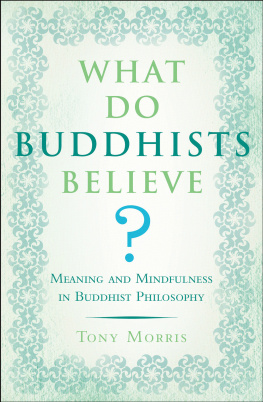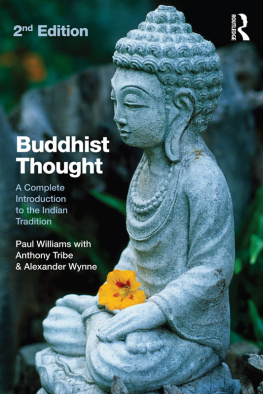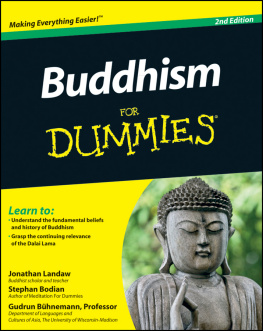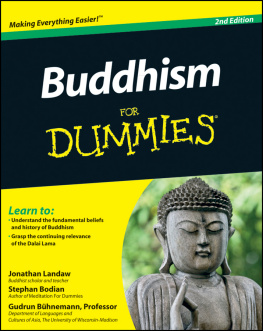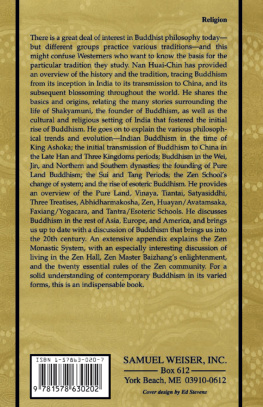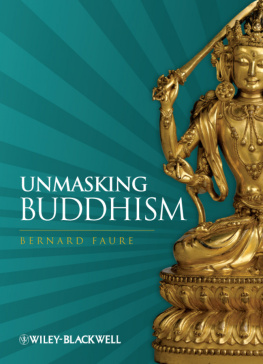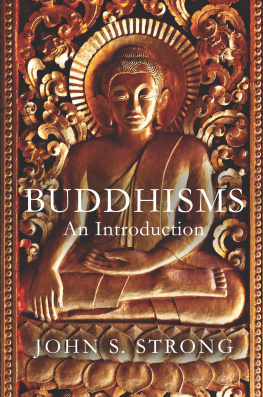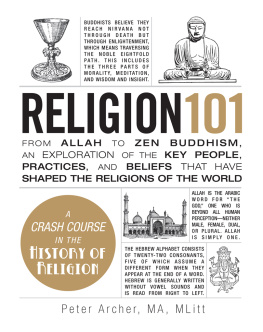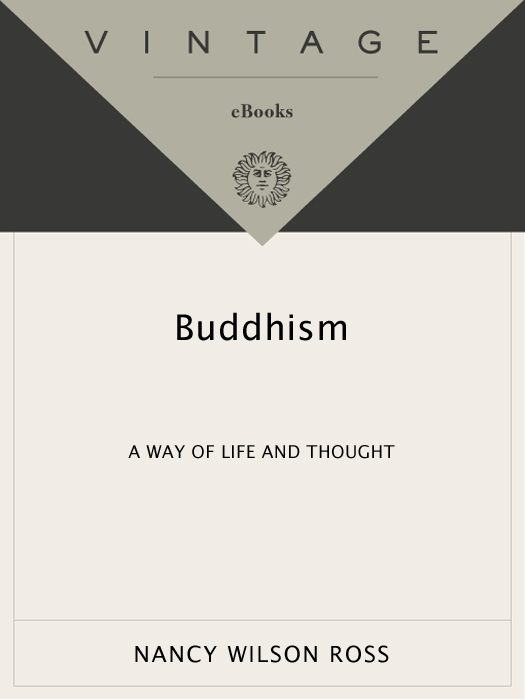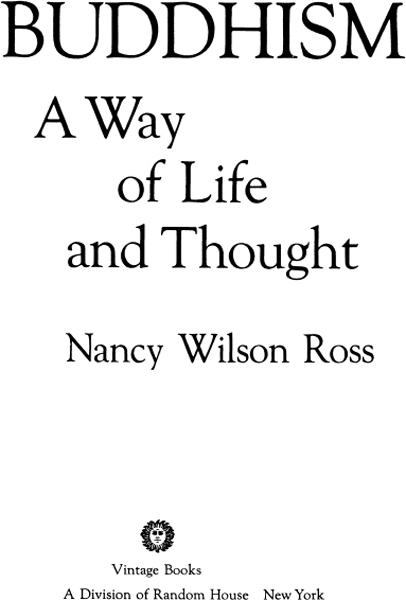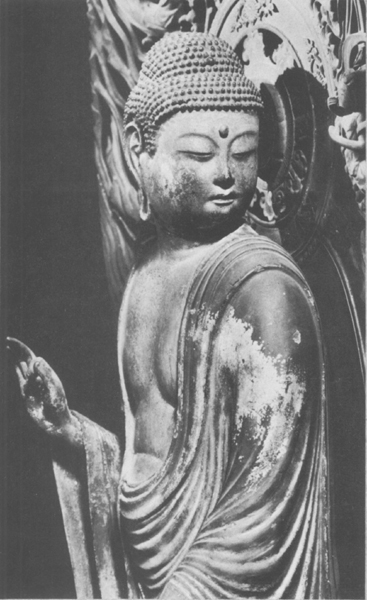
This book is gratefully and affectionately dedicated
to Richard Dudley Baker, the Roshi and Abbot
of the San Francisco Zen Center, through whose generosity
I was provided with personal assistants during the long, slow process
of completing this work
against heavy odds of health and circumstance.
I have often been asked how I, coming from a long line of Christians of different denominations, including, in various family branches, Presbyterians, Congregationalists, Unitarians and Episcopalians, happened in midlife to turn to the alien faith of Buddhism. It would not be easy to give a short answer to this question, and I was therefore happy to come on some lines from Antoine de Saint-Exupry which seemed to me to express my feelings.
Of what can we be certain except thisthat we are fertilized by mysterious circumstances? Where is mans truth to be found? Truth is not that which can be demonstrated by the air of logic. If orange-trees are hardy and rich in fruit in this bit of soil and not that, then this bit of soil is what is truth for orange-trees. If a particular religion, or culture, or scale of values, if one form of activity rather than another, brings self-fulfillment to a man, releases the prince within him unknown to himself, then that scale of values, that culture, that form of activity constitute his truth.
Antoine de Saint-Exupry
(Wind, Sand, and Stars)
Contents
Acknowledgments
Special mention and my warmest thanks go to John Bailes for his two years of patient, efficient and cheerful assistance in research, in typing and retyping, in reading and re-reading (often aloud); and also for similar services, although for a lesser stretch of time, to Lynn Hesselbart.
Lama Anagarika Govinda, Richard Baker-roshi, Lionel Landry, executive director of the Asia Society, Dr. Kathleen Raine, and Blythe Morley Brennan have my enduring gratitude for their conscientious reading of the manuscript at a critical time and for offering valuable suggestions.
Toinette Lippe at Knopf has remained, throughout, a devoted and effective editor.
Finally and personally, I cannot omit a list of names of young people whose presence in my household at different times in the last few years gave me encouragement and a variety of supports when and where they were most needed. In chronological order, they are: Yvonne Rand, Rene des Tombe, Richard Levine, Lucy McClintock, Karin Gjording, Deborah Madison, Dan Welch and Linda Cutts. Without them this book would never have been finished.
N. W. R.
The
Buddhas
Life
Story
and
Basic
Teachings
B uddhism, the religion of reason and meditation, was born in India in the sixth century before Christ and, down succeeding centuries, spread over vast stretches of Asia. Today it is estimated that between one-third and one-fifth of the people on earth follow some aspect of this many-aspected religious philosophy, and their number is steadily increasing, not only in Asian countries like Indiawhere Buddhism originated, declined and is now revivingbut also in modern Europe and America. Many modern Westerners now study and practice Zen; others have formed communities under the guidance of exiled Tibetans or have taken instruction in Theravada Buddhism with teachers from Burma, Sri Lanka or Thailand.
In a gentle way, without militant crusades or unyielding dogmatic emphaseswith, on the contrary, the quiet force of what might be considered historic inevitabilityBuddhism from its beginning slowly spread out from northeastern India. Moving southward and westward during and immediately after the founders time and, later, far to the east by way of the legendary silk routes and maritime passages from the southeastern coasts of the Indian subcontinent and the adjacent converted islands, it became in time the dominant influence in vast sections of Asia. Burma, Sri Lanka, Thailand, Cambodia, Vietnam, Laos, Mongolia, Tibet, Nepal, Bhutan, Sikkim, China, Korea and Japan are all countries which have been affected significantly by Buddhism. In the United States, Buddhist teaching centers are now scattered across the country from New England to California, and it is worth noting that in Hawaii, Americas newest state, Buddhism is the major religious denomination.
During its long centuries of quiet pilgrimage by land and sea, much of Buddhisms powerful influence may have had its source in the deliberate avoidance of claims to exclusive Truth, adherence to inflexible dogma, or the authority of any final, sacrosanct, theocratic hierarchy. The Come and see for yourself attitude of the original Great Teacher, Siddhartha Gautama, who became the Buddha, the Enlightened One, his pragmatic insistence on Dont take my word for it. Try it yourself! the unswerving challenge of his famous aphorism, Look within, thou art the Buddhaall this served to lower the resistance that so often attends the arrival of a new and unfamiliar faith. There can be no doubt that Buddhism contained, and still contains, the power to evoke original responses from many different cultures. It has stimulated people of different ethnic backgrounds to quickened creativity, to new syntheses and syncretisms which, oftener than not, have transcended narrow regionalism. The many subtle cross-fertilizations which Buddhism helped foster in the past are most easily traceable in works of art, but they are also exemplified in much of the literature of different sections of Asia, notably of Tibet, China and Japan.
What, then, was the origin of this exceptional religious philosophy which, in spite of its followers cultural differences, so plainly reflected in diverse forms of art, in varying attitudes toward ways of worship, and even in methods for attaining the final Buddhist goal, Enlightenment, could retain for more than 2,500 years a basic continuity and homogeneity?
Buddhism, unlike Hinduismthat other great India-born religion, which has not flourished notably outside the geographic boundaries of the Indian subcontinentis not a revealed religion. It was founded by a specific human being, the so-called historic Buddha, born Siddhartha Gautama in northwestern India six centuries before the Christian era. Any account of Buddhism must, therefore, properly begin with the oft-told story of the life of this remarkable religious genius.
The Buddha was the son of an aristocrat; rajah is the title most often given his father, although in some accounts he is called a king. The designation rajah serves well enough to indicate the kind of circumstances into which Siddhartha, a long-awaited heir, was born. He was born in a small Indian kingdom located on the southern borders of the Himalayan country known today as Nepal, roughly 100 miles north and east of the modern Indian city of Benares. His family belonged to one of the two leading castes of India, the Kshatriya, the aristocratic military class, equal in social standing to the priestly Brahmins but less involved in sacerdotal affairs.
The circumstances of the Buddhas birth and early life lent a specific force to his later teachings. When he declared that no distinctions of caste or former occupation should stand in the way of anyone who wished to become a disciple, he was speaking from a position of hereditary privilege that he had voluntarily relinquished. Upon occasion he emphasized his belief that Brahmins, those all-powerful guides and spiritual authorities who dominated Indian society, were no better than anyone else just by reason of their exalted birth. Only if they comported themselves in a manner worthy of honor had they the right to claim the privileges of superior status. This declaration fell little short of what Western religious terminology would label as heresy, since at that time the Brahmins were the indisputable spiritual arbiters of Indian life.


